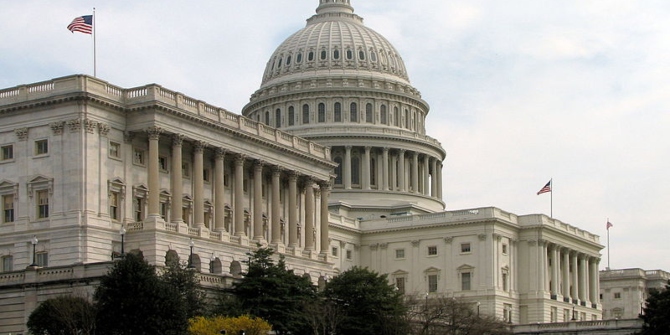 On Wednesday 6 March, the Phelan US Centre hosted the in-person and online event “Déja vu all over again? Super Tuesday and the Race for the Presidency” with Jason Casellas (University of Oxford, University of Houston), Ursula Hackett (Royal Holloway, University of London) and Mark Landler (New York Times), and Stephanie J Rickard (LSE Government). Uttishta Jagannathan gives an overview of the event and the Q&A segment.
On Wednesday 6 March, the Phelan US Centre hosted the in-person and online event “Déja vu all over again? Super Tuesday and the Race for the Presidency” with Jason Casellas (University of Oxford, University of Houston), Ursula Hackett (Royal Holloway, University of London) and Mark Landler (New York Times), and Stephanie J Rickard (LSE Government). Uttishta Jagannathan gives an overview of the event and the Q&A segment.
The Wednesday following Super Tuesday is always buzzing with new poll data and developments to analyze. On March 6th a panel, chaired by Phelan US Centre Director, Professor Peter Trubowitz, came together to discuss the results. The panel brought together experts on US politics and elections such as Professor Jason Casellas, Visiting Professor at Oxford University and Associate Professor at University of Houston, Ursula Hackett, Reader in Politics at Royal Holloway, Mark Landler, London bureau chief of the New York Times and Professor Stephanie J. Rickard, professor in the Department of Government at the London School of Economics. To begin the event, Professor Trubowitz presented the exit poll results as they related to President Joe Biden and former president Donald Trump’s candidacies, discussed college degree voting distributions and uncommitted votes among the Democrats.
Professor Jason Casellas began by outlining the importance of down-ballot voting, which refers to races for congressional and state legislatures, governors’ races, and judicial elections. States have become increasingly important with limited federal policymaking and “policy diffusion” between states on issues of education and Critical Race Theory. He also discussed potential weaknesses for the candidates’ voter bases. Joe Biden will be having issues mobilizing youth voters, while Donald Trump will have issues mobilizing suburban women voters and overcoming the legacy of the January 6th Capitol insurrection. Both will have to deal with the issue of their age as well.
Ursula Hackett began by describing the lack of suspense in this year’s Super Tuesday results, with a contest between an “incumbent and quasi-incumbent”. Hackett predicts that the November election will be extremely competitive and may “come down to a few thousand votes in the swing states”. Situating the election among American political trends, Hackett discussed how the unpopularity of both candidates is pushing policy making to the state level instead of the federal level. She finished by outlining how the challenges with American governance will persist till November and even potentially further.
As chief of the London Bureau of the New York Times, Mark Landler reminded the audience not “to get too hung up on polls”. He outlined how the primary polls are often driven by personality appeals yet the state of the economy will become paramount in the coming months. He mentioned the quote, “Democrats fall in love, Republicans fall in line”, and questioned if the Republican Party will fall in line once Trump is declared their candidate. He also pointed out that this election will be concerned with presenting their campaign as a referendum on their opponent’s presidential term.
To finish the panelists’ initial remarks, Professor Stephanie J. Rickard reaffirmed her predictions of a close election result and the importance of swing states. She discussed the likelihood of shy Republican non-Trump voters as it is uncertain where those who supported the primary candidacy of former South Carolina Governor, Nikki Haley, will now place their vote. In addition, the votes of uncommitted Democrats and their unwillingness to turn out will have implications for Biden, especially in the swing states.
During conversation with Professor Trubowitz, the panelists discussed the importance of the economy in the upcoming election although there are national and local economic disparities. Although the primaries have resulted in a repeat Biden and Trump contest, the possibility of a third-party candidate was discussed by the panelists.
The panelists then answered questions from the online and in-person audience on the vice-president selection, the rise of single-issue voters, the importance of the upcoming State of the Union speech, issues of Gaza and Ukraine, legal troubles for Trump and subsequent monetary advantages for Biden.
In summing up their opinions and key indicators for the election, the four panelists highlighted that they would monitor polling in swing states, policies on the economy as the election nears, the candidates’ vice-presidential appointments and the long-term impacts on democracy.
- Please read our comments policy before commenting.
- Note: This article gives the views of the author, and not the position of USAPP – American Politics and Policy, nor the London School of Economics.
- Shortened URL for this post: https://wp.me/p3I2YF-dGn






